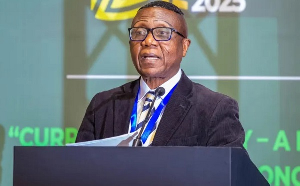While most states [in the United States of America] tightened requirements for obtaining driver's licenses after 9/11, illegal Ghanaian immigrant Sam P. Thompson was able to obtain commercial driver's licenses to operate trucks in at least two states -- Maryland and Kentucky, records disclose.
Today, Thompson, 32, of Gaithersburg, Md., sits in the Westmoreland County Prison in lieu of $100,000 bond awaiting a preliminary hearing on vehicular homicide and other charges after driving a tractor-trailer that rear-ended a car along the Pennsylvania Turnpike last week, killing a Honduran diplomat.
The body of Nuria Ortiz Navarro, 31, a trade and investment promotion counselor for the Honduran embassy in Washington, was returned last weekend to Honduras for burial.
In a brief court appearance last week, Thompson claimed he had immigrated to the U.S. from Ghana eight years ago and lived and worked in Maryland for the past 2 1/2 years.
"He did possess a class CDL license in the state of Maryland, and it is valid," said Buel Young, spokesman for Maryland's motor vehicle department.
Records indicate that before he moved to Maryland, Thompson lived and worked in Kentucky, where he had carried a valid driver's and commercial license dating to 2005, according to officials there.
Kentucky officials maintain that privacy rules prohibit them from discussing how Thompson obtained valid driver's licenses in that state. But that state's published guidelines indicate that an applicant must have proper credentials stamped by the U.S. Immigration and Customs Service.
In May, Thompson received his driver's license and commercial trucking license in Maryland, according to the state's motor vehicle department records. It is valid until February 2011.
Maryland is among a handful of states -- including Oregon and Maine --- that do not require proof that a person is in the United States legally before issuing a driver's license, Young said.
A 2003 opinion by the Maryland attorney general concluded that nothing in state law stops illegal immigrants from obtaining licenses, as long as they can produce what the state requires for a license -- identity, age and state residency, he said.
Young declined to say whether Thompson presented the Kentucky license to obtain the Maryland license.
In most cases, driver's licenses are a state matter, transportation officials said.
Thompson could not have obtained a driver's license in Pennsylvania, PennDOT Safety Administration community relations coordinator Danielle E. Klinger said.
"An illegal immigrant cannot obtain a driver's license in Pennsylvania. This applies to those individuals who are applying for a noncommercial or a commercial driver's license," she said.
"Pennsylvania law requires that an individual has legal presence in the United States in order to obtain a driver's license as well as meet our identification and residency requirements," she said.
Since Thompson entered the U.S. in 1998, authorities and records indicated he bounced from job to job, residence to residence, and state to state, just ahead of U.S Immigration and Customs officials trying to deport and question him.
After immigration agents caught up with Thompson last year, the agency began legal proceedings to deport him, said state police Sgt. Anthony DeLuca, commander of the New Stanton station investigating the crash in Arona.
"It is my understanding that (Thompson) never possessed any proper documentation to enter this country. Basically, we've been told that he snuck into this country illegally and immediately began working here," DeLuca said.
"There is no record he ever even tried to appeal the deportation order," DeLuca said.
Repeated attempts to speak with federal immigration and Homeland Security officials in Washington to discuss Thompson's deportation status were unsuccessful.
At the time of last week's fatal turnpike crash, Thompson and others were being sued for $25,000 by Tammy Evans, 36, of Silver Spring, Md., in connection with a Sept. 20, 2003, crash in Montgomery County, Maryland.
A traffic signal was not working because of a storm, and a police officer was directing traffic at an intersection where Thompson was stopped while driving a tractor-trailer for C&L Partners, of Rockville, Md., said Evans' attorney, Richard S. Lundin.
"He put it in reverse and backed into her," the attorney said.
Lundin said it took three private investigators and several weeks before Thompson could be located in Frederick, Md., to serve papers so a deposition could be held.
Records showed that Thompson had been charged in Maryland with minor traffic violations, but they eventually were dropped.
Lundin added his investigators determined that in recent weeks Thompson was living in Frederick with a relative. A woman who answered the telephone at that address declined comment.
In his brief appearance before Hempfield District Judge Mark Mansour last week, Thompson denied responsibility for the crash that killed Ortiz Navarro. He claimed that he is not an illegal immigrant and has valid work permits.
Thompson's employer, Transcare Systems Inc., of Bowie, Md., operates only one tractor-trailer, according to the Federal Motor Carrier Safety Administration's records.
Agency records show the driver of the truck had two violations in 2006 -- both for driving too many hours in a daily period. Duane DeBruyne, spokesman for the carrier administration, and others declined to say whether Thompson was driving the truck then.
DeBruyne said his agency can step in when a commercial license is up for renewal. Other federal agencies, including the Office of Homeland Security and the Department of Defense, watch licenses involving hazardous material transportation, DeBruyne and others said.
The issue of licensing people who are in the country illegally could become moot when the READ ID Act takes effect in May 2008, said Ira Mehlman, spokesman for the Federation for American Immigration Reform.
The law, enacted in 2005 and based on recommendations made by the 9/11 commission, establishes national standards for issuance of driver's licenses. One of those requirements would bar people who are in the country illegally from getting them, Mehlman said.
Efforts are under way, however, to delay implementation of the act.
Proponents say the law would improve national security and road safety. Critics say the law would make it more difficult for anyone -- including American citizens -- to get licenses. They contend licensing should be a state, not federal, issue.
Diaspora News of Thursday, 15 February 2007
Source: TRIBUNE-REVIEW
Illegal alien's licenses are legal













